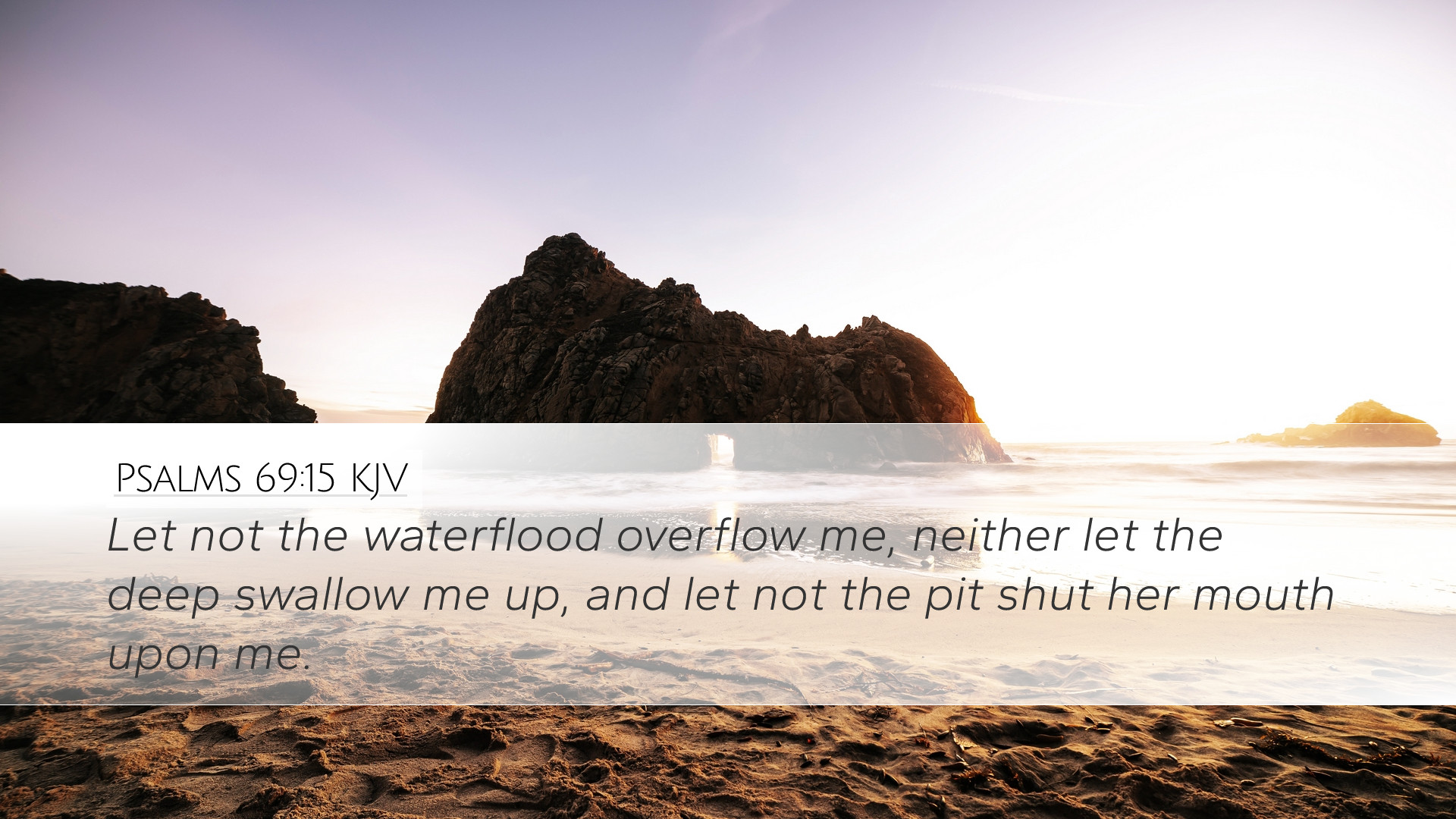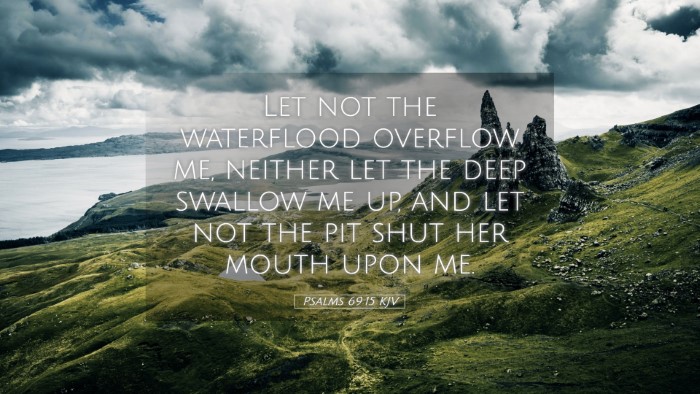Commentary on Psalms 69:15
Verse: "Let not the waterflood overflow me, neither let the deep swallow me up, and let not the pit shut her mouth upon me."
Contextual Understanding
This verse is set within a lamentation of David, characterized by his anguish and pleas for divine intervention. The psalmist finds himself in deep distress, often depicted through the imagery of drowning and being swallowed by the deep. The metaphorical use of water floods signifies overwhelming troubles, while the pit represents a state of despair or death.
Theological Implications
Psalms 69:15 captures the essence of human vulnerability in the face of natural and spiritual adversities. The prayer for deliverance underscores a broader theological theme found throughout scripture: the need for reliance on God amidst overwhelming circumstances. It reflects the belief that God is a refuge and a source of salvation.
Insights from Matthew Henry
Matthew Henry, in his commentary, emphasizes the desperate condition of the psalmist. He notes that the imagery of water is profoundly significant, representing floods of temptation, trials, and sorrows that can engulf a person. Henry encourages believers to recognize the importance of calling upon God in times of trouble. The plea for deliverance from the waterflood symbolizes the hope that even in the depths of despair, God can provide salvation.
Key Reflections
- Divine Rescue: Henry suggests that the psalmist’s request is rooted in faith that God is capable of delivering him from all forms of distress.
- Life’s Trials: The floods signify life's trials which every believer encounters, reinforcing the need for divine assistance.
- Restoration from Despair: The emphasis on the pit denotes total hopelessness, yet the psalmist’s cry signifies an appeal for restoration and renewed hope.
Albert Barnes' Analysis
Albert Barnes approaches this verse by elaborating on the metaphorical language used. He interprets the "waterflood" as representing the overwhelming circumstances and trials faced by believers. Barnes notes that the metaphor not only illustrates physical peril but also spiritual desolation. His commentary enhances the understanding of how deep emotions and external hardships can align to create a profound need for God's intervention.
Important Lessons
- Spiritual Awareness: Barnes encourages readers to cultivate a spiritual awareness of their environment, recognizing when they are in danger of being overwhelmed.
- Persistent Prayer: The urgency of the prayer reflects the importance of persistent prayer in moments of deep distress.
- God’s Deliverance: Barnes emphasizes that the psalmist expresses a confidence in God’s ability to deliver from insurmountable odds, urging believers to remain steadfast in faith.
Adam Clarke’s Commentary
Adam Clarke provides a detailed analysis of the words and phrases in Psalms 69:15, noting that the psalmist employs various expressions to communicate the intensity of his distress. Clarke highlights the historical context, suggesting that David may have been facing persecution or betrayal, further intensifying his call for help. His commentary encourages a physical and emotional connection to the text, highlighting the real experiences of anguish and despair felt by the psalmist.
Significant Observations
- Historical Context: Clarke points out that understanding the historical context enriches the reading of the psalm, particularly in relation to David’s life.
- Emotional Intensity: Clarke reflects on the psychological dimensions of the psalmist’s plea, advocating for recognition of one's feelings in prayer and seeking God in those moments.
- Hope in Adversity: Clarke’s interpretation reinforces the potency of hope amidst adversity, suggesting that even when overwhelmed, turning to God is paramount.
Application for Today’s Believers
For pastors, students, and theologians, Psalms 69:15 provides a powerful reminder of the human condition and the importance of turning to God in times of distress. The collective insights from the commentaries reflect a rich theological heritage that encourages introspection, prayer, and reliance on divine intervention.
Prayerful Reflections
In light of what has been discussed, it is vital for believers to integrate prayers that acknowledge their struggles while trusting in God’s unfailing love and rescue. This psalm encourages faithful servants to remain steadfast, knowing that even in their darkest moments, God hears their pleas.
Conclusion
Psalms 69:15 serves as an enduring testament to the faithfulness of God amidst trials and tribulations. The reflections drawn from the writings of Matthew Henry, Albert Barnes, and Adam Clarke provide a multi-faceted understanding that encourages believers to pray earnestly, seek refuge in the Lord, and maintain hope even when the waters rise and threaten to overwhelm.


